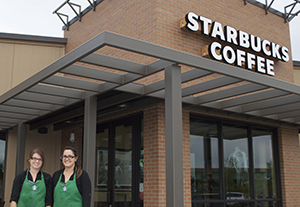The Starbucks Plan: A Big Step Forward, But Challenges Remain
Published by: WCET | 7/31/2014
Tags: Access, Collaboration/Community, Completion, Credentials, Financial Aid, Innovation, Online Learning, WICHE, Workforce/Employment
Published by: WCET | 7/31/2014
Tags: Access, Collaboration/Community, Completion, Credentials, Financial Aid, Innovation, Online Learning, WICHE, Workforce/Employment
Our WICHE Colleague, Patrick Lane, senior policy analyst and the project coordinator for the Adult College Completion Network, shares with us today a recap, originally posted on the ACCN blog, of what the Starbucks-ASU partnership means for employees and how for many of them, as adult students with many commitments, there are still barriers the program doesn’t address.
The Starbucks-Arizona State University (ASU) partnership that will provide tuition reimbursement for employees in their last two years of postsecondary education garnered a good deal of press recently. The program has many interesting components that will benefit a broad range of students who are employed by Starbucks, but this post focuses on the implications of this new program for adults with prior college credit but no degree. Looking more closely at the agreement highlights the importance of several policies and practices that can be barriers to adult degree completion.
First, here’s a quick recap of the benefit, which is linked to ASU’s online program, and what it offers to Starbucks employees:

Starbucks certainly deserves commendation for making an aggressive move to support employee education, regardless of whether or not it benefits the company’s bottom line. (Some research shows that tuition reimbursement programs can have a positive return on investment mainly due to lower recruitment costs and increased retention, but typically those programs have a smaller overall reimbursement than imagined here.)
Still, like many other tuition reimbursement programs, the Starbucks-ASU program presents some barriers for potential returning students, but also highlights some promising strategies.
The up-front costs for students will be high. If employees only receive reimbursements each time they complete 21-credit chunks, they will be on the hook for a portion of tuition and fees even after accounting for Pell grants and other sources of financial aid. This burden will likely reduce the number of Starbucks employees who take advantage of the benefit. The Council for Adult and Experiential Learning (CAEL) has found that eligible employees are much more likely to take advantage of tuition assistance programs when those benefits are prepaid compared to when they are on a reimbursement basis. Their research shows participation in prepaid programs at 14 percent of eligible employees compared to 5 percent for reimbursement-based programs.
Starbucks – and other employers offering tuition reimbursements – could reduce this burden by converting the program to “tuition assistance” that is distributed when the employee has to pay his or her tuition bill. Other incentives or mechanisms to require repayment if the employee does not complete the milestone could be put in place to achieve the same ends without unduly burdening the employee.
Coaching can pay off. Part of the arrangement calls for Starbucks to pay for students’ retention coaches. Research on coaching – which typically involves intensive advising focused on managing commitments within and outside of postsecondary education, navigating the college bureaucracy, and focusing on post-graduation career goals – has shown some evidence of success, with students who receive coaching being more likely to persist and graduate.
Evaluation of transfer credit is crucial. It is probably safe to assume that many of the Starbucks employees hoping to take advantage of the program have earned college credit at institutions other than Arizona State University. Like many other non-traditional students enrolling at a new institution, the amount of time they will need to spend to finish their degree will depend a great deal on how their transfer credit is evaluated and applied (or not) toward a major. Rejecting credits or granting only elective or general education credits can cause returning adults to spend significant extra time finishing a degree.
Competing demands on students’ time may make completion difficult. Some of the press commentary and critiques have noted that employees working 20 hours a week or more may find that it is difficult to fit in the necessary coursework to finish a degree. This is hardly news for those who work with adult students, and not really a valid critique of Starbucks’ benefit, but more a reflection on what working adults returning to college regularly face. Generally speaking, institutions can adopt policies and practices that make it easier to manage these demands, such as advising options outside of business hours, having business and financial aid offices open longer hours, or providing “concierges” to help guide students through the difficult process of reenrolling. As an example, ASU provides ways for students to talk with financial aid staff 24/7.
Overall, Starbucks’ offering has (for the moment) shined a bright spotlight on the challenges faced by adult students, as well as some of the promising strategies to help them succeed. It will be interesting to watch to see whether other companies begin to adopt similar programs and to what extent this affects the broader landscape of adult education.
Senior Policy Analyst
& Project Coordinator
WICHE Policy Analysis & Research